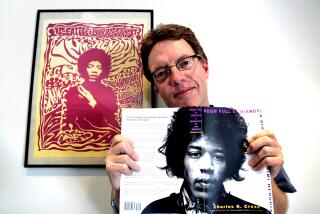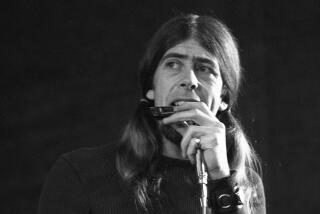Mick Farren dies at 69; British rocker embodied ‘60s spirit
Mick Farren, the British rocker, science-fiction writer, social critic and provocateur who embodied the rebellious spirit of the counterculture throughout a career that ranged from Britain’s underground music clubs to Los Angeles’ alternative journalism scene, died July 27 in London. He was 69.
Farren was performing with his band, the Deviants, when he collapsed from a heart attack, said longtime friend Wayne Kramer, former guitarist of the Detroit band the MC5.
“He couldn’t have written it better,” said Kramer. “This is a guy who loved to be on stage.... So for him to be in the middle of the verse, and all of a sudden get a headache, and then he’s gone? It’s beyond merciful. It’s ... brilliant.”
In the late 1960s, Farren led the psychedelic rock band the Deviants, promoting a raw sound he called “British amphetamine psychosis music” that presaged the confrontation and rough edges of punk. Over the next decades he performed sporadically as a solo artist and with various configurations of the Deviants while turning out elegant, streetwise prose.
He wrote more than 30 books of fiction and nonfiction, including a cultural study of the black leather jacket, several volumes on Elvis Presley, a series of vampire novels and a wild fantasy called “Jim Morrison’s Adventures in the Afterlife” (1999), wherein the Doors singer wanders a hereafter of orgies and intrigue with Doc Holliday, Dylan Thomas and Aimee Semple McPherson.
Harlan Ellison, a fellow author of speculative fiction who knew Farren for four decades, called his writing “quite muscular.”
“Mick made his living as a creative intellect — whether he was writing a book or he was playing with a band or he was doing poetry or journalism,” Ellison said.
Farren’s prolific career included time as a writer and editor for the British underground newspaper International Times, also known as IT, beginning in 1967. He became a staff writer at the influential music journal New Musical Express, or NME, in 1974 and examined a wide range of popular culture. He also contributed lyrics to the bands Hawkwind and Motörhead, including the song “Damage Case,” later recorded by Metallica.
In 1980, he moved to New York and was a frequent contributor to the Village Voice, Trouser Press and other publications. A decade later he relocated to the West Coast and was a columnist on the media, presidential politics and end-of-the-world conspiracies at two L.A. weeklies, the L.A. Reader and Los Angeles CityBeat.
One of his best-known essays was “The Titanic Sails at Dawn,” published in 1976 amid the early rumblings of punk rock in the NME. In that piece Farren warned of the growing distance between once-heroic rock acts and their fans: “Has rock ‘n’ roll become another mindless consumer product that plays footsie with jet set and royalty while the kids who make up its roots and energy queue up in the rain to watch it from 200 yards away?”
“In a lot of ways he predicted punk. He saw it coming because he was already cynical of the bloated rock star,” Kramer said. “He really had a clear sense of what rock meant, how rock fit into the fabric of culture. It wasn’t supposed to be acceptable. And he embraced it and was militant about it.”
He was born in Cheltenham, England, on Sept. 3, 1943, the son of an RAF bomber pilot killed in World War II. He studied graphic design at St. Martin’s School of Art in London, and soon encountered an accelerating swirl of marijuana, protest and acid rock as both observer and enthusiastic participant.
His brand of 1960s extracurricular activity was less flower power and Carnaby Street than pranksterism and storming the cultural barricades, most notoriously at the 1970 Isle of Wight Festival, where fences were torn down and people poured in for free.
He co-founded the UK branch of the White Panthers, a radical anti-racism group, and helped organize the anarchic free Phun City Festival, a shambolic gathering that featured the MC5 and Beat writer William Burroughs.
Farren was one of several British hippies who infiltrated the TV studio audience of host David Frost when American activist Jerry Rubin was a guest. Farren stood up in denim vest and polka dots to lecture Frost on the end of Western society.
In 1971, he was tried in London on obscenity charges for publishing the adult comic book Nasty Tales, which included the work of Robert Crumb. Farren was acquitted.
He recalled his formative days in the counterculture in his 2001 autobiography “Give the Anarchist a Cigarette,” a title lifted from an offhand remark by Bob Dylan in the 1967 documentary “Dont Look Back.” His newest book was “Elvis Died for Somebody’s Sins But Not Mine,” a collection of essays and journalism published in March.
In addition to the Deviants, he performed with the protopunk Pink Fairies. During his solo career he was known for his signature rant, “Let’s Loot the Supermarket Again Like We Did Last Summer.”
In 2010 he moved back to England and began to assemble the newest version of the Deviants, who shared the stage with him at his final performance.
Married and divorced twice, Farren had no children and leaves no immediate survivors.
Appleford, who writes for Times Community Newspapers, is a former editor of Los Angeles CityBeat.
More to Read
Start your day right
Sign up for Essential California for the L.A. Times biggest news, features and recommendations in your inbox six days a week.
You may occasionally receive promotional content from the Los Angeles Times.







